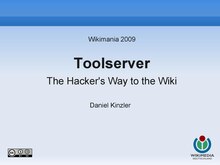In memoriam: the Toolserver (2005–14)

In the early hours of Tuesday morning, Wikimedia Germany's Toolserver project was switched off, marking the end of one of the Wikimedia movement's longest running Chapter-led projects. The Toolserver, which was in fact a collection of servers, first came online in 2005, hosting hundreds of webpages and scripts ("tools") made available for use by Wikimedia readers, editors and administrators.
The Toolserver is survived by its spiritual successor Wikimedia Tool Labs, part of the broader "Labs" project begun by the Wikimedia Foundation as far back as 2011 (see previous Signpost coverage). Tool Labs already holds some 800 tools, many of them migrated from the Toolserver and diverse in their nature. Particularly popular tools, many of them familiar to regular editors, include the Wikidata Game, CatScan (for finding articles in multiple categories) and GeoHack, a tool for placing article subjects onto maps. A full index is also available.
In contrast to the Toolserver, which operated a more relaxed policy, all tools hosted on Tool Labs must be open-source, allowing for a more obviously collaborative development environment. In exchange for access to the Wikimedia Foundation’s technical infrastructure, tools must be open-licensed, allowing them to be redistributed and remixed in a similar way to on-wiki contributions.
The Tools project is, however, just one part of Wikimedia Labs, which also incorporates a broad array of more than 150 other standalone software "projects" (collections of one or more virtual machines). The growing need for these other projects, which include test versions of Wikipedia and its sister projects, provided one motivation for a changeover which at times has been far from uncontroversial (see previous Signpost coverage).
Over recent weeks, the Toolserver continued to receive millions of hits per day and users are advised to keep an eye out for broken links and missing functionality as developers adjust to the new environment. In some cases, tools may need new owners to migrate and/or adopt them over the longer term. A page on MediaWiki.org records notable absences, and a table has been created to show replacements.

